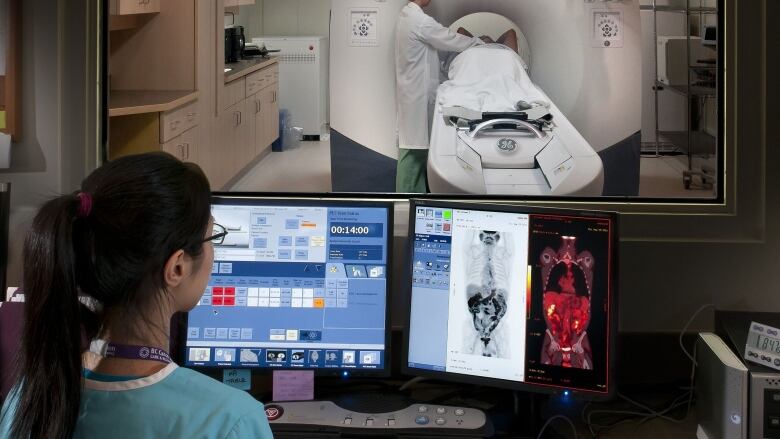Ontario government stalling introduction of PET scanners, Sudbury doctor says
'People in Ontario are more likely to die simply because they will not have access'

A Sudbury doctor says his community's struggle to get an important piece of cancer detection equipment is another example of the provincial government's attemptto block the technology.
Sudburianshave spent years trying to raise millions of dollars to buy its hospital a PET scanner. A Positron EmissionTomography(PET) machine uses a type of sugar to detect cancer, cardiac issues andeven dementia.
The Ministry of Health and Long-Term Care has told the city it's up to residents toraise the money needed to buy the region's first machine, which is estimated to cost as much as$5 million dollars.
- Sudbury should've had PET scanner 'a long time ago,' charity leader says
- Province to payoperating costs for PET scanner in Sudbury
Dr. Dave Webster says asking the community to foot 100 per cent of the bill is a way for the ministry to purposefully slow down the introduction of PET technology across Ontario.
"It's quite simple.They don't want to pay for it," he said.
Patients 'would havesurvived' with PET scan

"You have patients that would have survived their cancer had they had a PET scan at an appropriate time," he said. "And similarly, there are people that are told therapy is not possible and the PET scan shows they are."
"People in Ontario are more likely to diesimply because they will not have access to what has simply been the standard of care on following up with cancer patients for more than a decade," he said.
Doctor resigns from PET committee in protest
Windsor doctor Kevin Tracey was a founding member of a ministry-backed committee set up more than 15 years agoto bring PET technologyto Ontario.
He said he resigned in protest because the government was purposefully slowing down access to the scan.
"Basically, we're holding the number of patients down that need scans done. I'm sure there's monetary reasons why that's done," he said.
Basically, we're holding the number of patients down that need scans done.- Kevin Tracey, Windsor doctor
Tracey said over the years, the ministry decided to commission its own research on the effectiveness of thePET scan, despite numerous worldwide studies already showing itworked.
He said although the scan has its limits, there are many instances where cancer patientsshould be given aPET scan, such as seeing if a patient's breast cancer has returned.
"But those indications are not routinely done in Ontario," Tracey said. "You have to apply for them, they are very cumbersomeand they are often refused."
Ontario's access to PET scans worst in western world
Tracey said Ontario is doing fewer PET scans than just about anywhere in the western world.
Ontario performs 11,000 PET scans per year, according to Cancer Care Ontario.
While Quebec performs nearly four times that number, more than40,000 scans annually, with a much smaller population.
"It really is a routine test now in cancer. Not just the diagnosis, but the follow-up of patients that have been put on therapyand the scanning of patients when you think their cancer might have come back."
The Ministry of Health and Long-Term Care has promised to pay the $1.6 million needed to operate Sudbury's PET scanner annually, once the community has raised enough money to purchase it.
In an email to CBC News, the ministry said it has increased the use of insured PET scans by approximately ten per cent a year, every year,since2009.












_(720p).jpg)


 OFFICIAL HD MUSIC VIDEO.jpg)
.jpg)



























































































